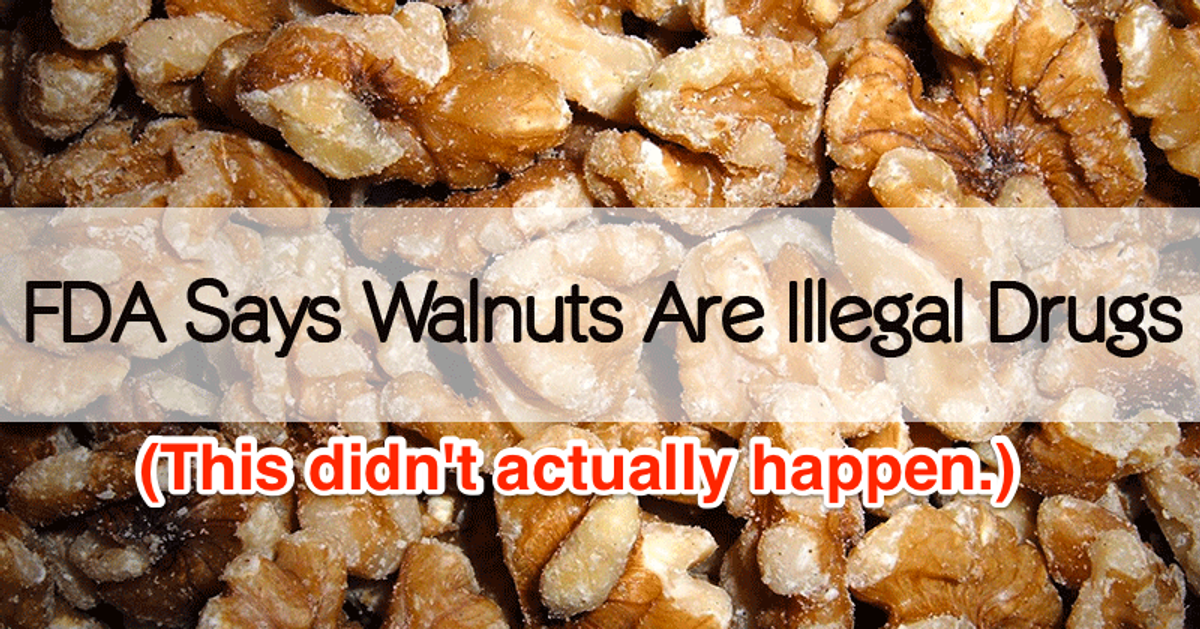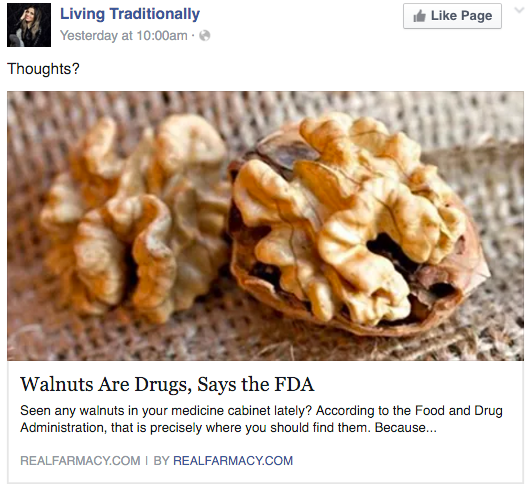Sometimes, the circulation of misinformation revives interest in separate, similar, but still inaccurate claims. This appeared to be the case with a March 2016 internet rumor alleging that the Food and Drug Administration classified walnuts as drugs.
In February and March 2016, the FDA was already the subject of rumors that the agency "outlawed" cannabidiol (CBD) oils. Almost immediately, rumors began to surface on social media that walnuts had also recently fallen prey to preposterous reclassification by the FDA.
While the rumors weren't new, interest in whether walnuts were drugs spiked in March 2016. Many social media users linked to a RealFarmacy item from 2013. On 23 March 2016, the Facebook page "Living Traditionally" shared the 2013 article as if its claims were new:
The 2013 article claimed that FDA sent letters to walnut distributor Diamond Foods deeming that their "walnut products [were] drugs":
Seen any walnuts in your medicine cabinet lately? According to the Food and Drug Administration, that is precisely where you should find them. Because Diamond Foods made truthful claims about the health benefits of consuming walnuts that the FDA didn’t approve, it sent the company a letter declaring, “Your walnut products are drugs” — and “new drugs” at that — and, therefore, “they may not legally be marketed … in the United States without an approved new drug application.” The agency even threatened Diamond with “seizure” if it failed to comply.
RealFarmacy also claimed that manufacturers' First Amendment rights were being infringed by the FDA's regulation of unsubstantiated health claims:
Of course, if the Constitution were being followed as intended, none of this would be necessary. The FDA would not exist; but if it did, as a creation of Congress it would have no power to censor any speech whatsoever. If companies are making false claims about their products, the market will quickly punish them for it, and genuine fraud can be handled through the courts. In the absence of a government agency supposedly guaranteeing the safety of their food and drugs and the truthfulness of producers’ claims, consumers would become more discerning, as indeed they already are becoming despite the FDA’s attempts to prevent the dissemination of scientific research. Besides, as [another blog] observed, “If anyone still thinks that federal agencies like the FDA protect the public, this proclamation that healthy foods are illegal drugs exposes the government’s sordid charade.”
The site linked to a letter publicly shared on the FDA's website, which was already several years old by the time the 2013 article was published, and which plainly indicated that its action was due to health claims made about walnuts in labeling and marketing:
The Food and Drug Administration (FDA) has reviewed the label for your "Diamond of California Shelled Walnuts" products and your website at www.diamondnuts.com. Based on our review, we have concluded that your walnut products are in violation of the Federal Food, Drug, and Cosmetic Act (the Act) and the applicable regulations in Title 21, Code of Federal Regulations (21 CFR) ... Based on claims made on your firm's website, we have determined that your walnut products are promoted for conditions that cause them to be drugs because these products are intended for use in the prevention, mitigation, and treatment of disease. The following are examples of the claims made on your firm's website under the heading of a web page stating "OMEGA-3s ... Every time you munch a few walnuts, you're doing your body a big favor.":
"Studies indicate that the omega-3 fatty acids found in walnuts may help lower cholesterol; protect against heart disease, stroke and some cancers; ease arthritis and other inflammatory diseases; and even fight depression and other mental illnesses."
"[I]n treating major depression, for example, omega-3s seem to work by making it easier for brain cell receptors to process mood-related signals from neighboring neurons."
No part of the letter said (or even implied) that walnuts had been subjected to a sweeping reclassification as drugs, and in the ensuing six years, no one was arrested for or charged with possession of walnuts with intent to distribute. Additionally, the FDA didn't ban, regulate, or demand withdrawal of Diamond Foods' walnuts, or any other, from the market, but did go after the company for unauthorized health claims:
The back of your product label also bears the following statement: "The omega-3 in walnuts can help you get the proper balance of fatty acids your body needs for promoting and maintaining heart health. In fact, according to the Food and Drug Administration, supportive but not conclusive research shows that eating 1.5 oz of walnuts per day, as part of a low saturated fat and low cholesterol diet, and not resulting in increased caloric intake, may reduce the risk of coronary heart disease. Please refer to nutrition information for fat content and other details about the nutritional profile of walnuts." Although FDA exercises enforcement discretion over the last two sentences of this statement, which meet the criteria for a qualified health claim for walnuts and coronary heart disease, the last two sentences read in conjunction with the first sentence makes the entire statement an unauthorized health claim.
The statement suggests that the evidence supporting a relationship between walnuts and coronary heart disease is related to the omega-3 fatty acid content of walnuts. There is not sufficient evidence to identify a biologically active substance in walnuts that reduces the risk of CHD. Therefore, the above statement is an unauthorized health claim. This letter is not intended to be an inclusive review of your products and their labeling. It is your responsibility to ensure that all of your products comply with the Act and its implementing regulations.
As with claims that CBD oils were outlawed, blogs and Facebook pages spreading rumors that walnuts had been reclassified as drugs either didn't read or misrepresented the FDA's warning letters. In both instances, manufacturers were warned about use of marketing and labeling language that warranted classification of the products in question as drugs, primarily pertaining to suggestion that the substances or foods were "intended to diagnose, treat, cure, or prevent any condition."
The warnings were specifically due an "unauthorized health claim," and products that are not classified as drugs by the FDA are not legally allowed to make such claims. However, the letters in no way indicated that walnuts had been classified as drugs.
Prior dubious items from RealFarmacy included claims that science disproved a link between sun exposure and skin cancer, and another baselessly accusing unspecified pro-GMO bioterrorists of sabotaging Chipotle's product supply with foodborne pathogens.


